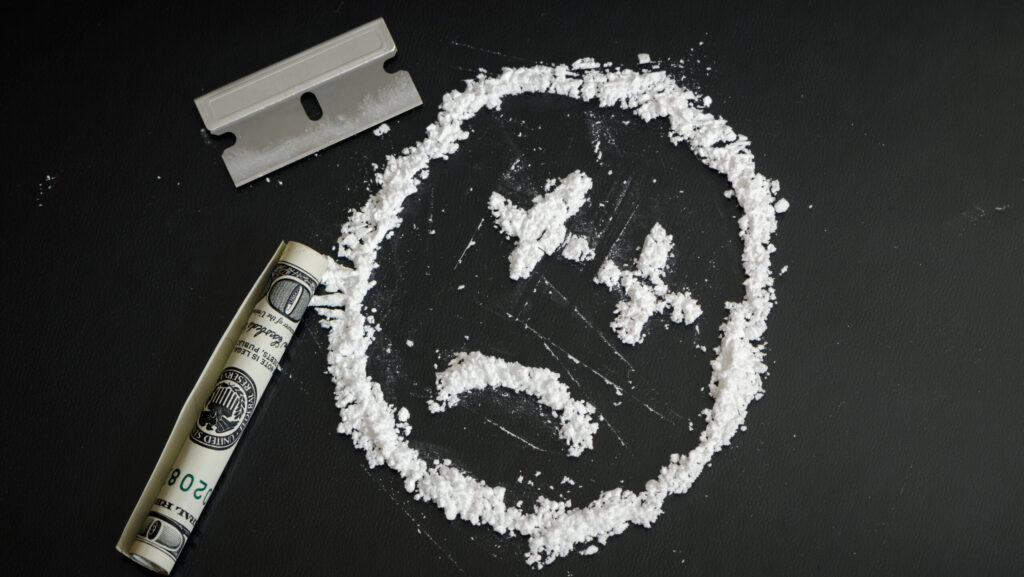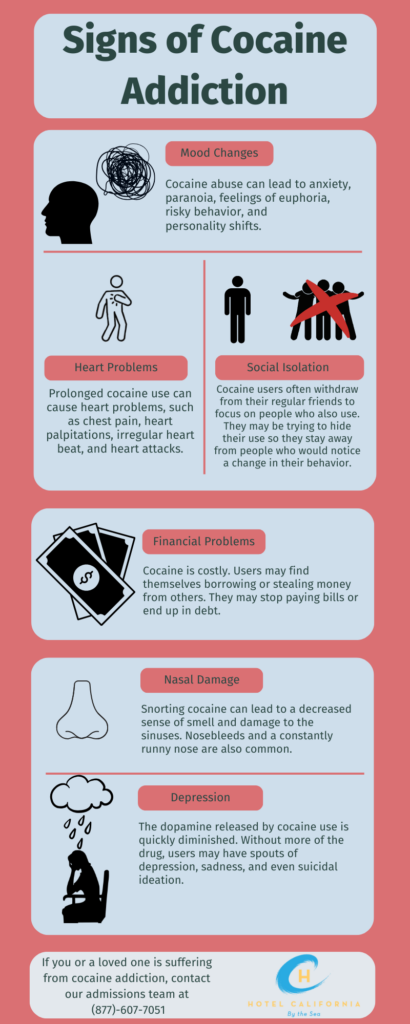How long does Cocaine stay in your urine?
Cocaine is one of the most addictive drugs and one of the most difficult addictions to overcome. The stimulant substance works by affecting the brain’s reward system and increasing the “feel good” chemical dopamine. In addition to its potent and habit-forming nature, cocaine has a shorter half-life than many other drugs. This encourages users to continue excessive drug use in order to experience the same level of effects. But how long does cocaine stay in the body? How long does cocaine stay in your blood? And how long does cocaine stay in your urine?
The central nervous system stimulant originates from the coca plant native to South America. Cocaine looks like fine white powder that is usually cut or mixed with other substances such as baking soda or other drugs. Method of ingestion includes inhaling or smoking, injecting, snorting or orally ingesting.

In a normal brain, dopamine is released and reprocessed back into the cell. This shuts off the signals between the nerve cells. When cocaine enters the body, it prevents dopamine from being reprocessed so there is more dopamine floating around and available in the brain’s area between nerve cells. When this happens, it blocks off the communication between the nerve cells allowing for more dopamine to remain and not be recycled back into the cell.
The immediate effects of cocaine use are euphoria, high energy, increased alertness, hypersensitivity, irritability and paranoia. The feelings of euphoria, high energy and alertness, are what most drug users seek when abusing the drug.
Dopamine is known as a “feel good” chemical that is involved in functions of mood, memory, pleasurable reward and motivation. Extra dopamine in the brain encourages repeated drug use because it results in euphoric feelings. When this happens, an addiction can form. Cocaine abuse can cause psychological addiction and physical dependence.
How long do the Effects of Cocaine last?
The duration of the effects cocaine has on a user is dependent on many different factors. Cocaine is broken down quickly in the body compared to other mind-altering substances and therefore generally has a shorter effect duration time. One significant factor is the method of drug ingestion. Many users snort cocaine, which allows them to feel the rush and euphoric effects more quickly. However, the duration and intensity of the cocaine high and its effects, aren’t the same for everyone.
If the drug is inhaled through smoking, the onset of effects can begin within seven seconds. The effects peak around 1-5 minutes and can last for 5-10 minutes.
If the drug is injected intravenously or intramuscularly, the onset of effects can begin within 15 seconds. The effect peaks around 3-5 minutes and lasts 20-30 minutes.
If the drug is snorted, the onset of effects can begin within three minutes. The effects peak around 15 minutes and can last for 15-30 minutes. A cocaine high from gumming can last up to 30 minutes.
If the drug is orally ingested, the onset of effects can begin within 10 minutes. The effects can go as long as around 60 minutes.

How long does Cocaine stay in your Urine?
When testing for cocaine in the body, urine tests are often used. This is because it is one of the most accurate measurements of detecting cocaine in the body. Cocaine has a shorter half-life than many other drugs and can be metabolized in the body more quickly. Cocaine’s half-life is around six hours. Because of its short half-life, the effects of cocaine are also shorter than most other drugs. This causes users to continually use and binge on the drug in order to feel its effects over a longer period of time.
Urine drug tests usually test for cocaine or its metabolites called benzoylecgonine. Cocaine metabolism occurs in the liver where enzymes break down the drug multiple times in order to create the cocaine metabolites. These cocaine metabolites, which are formed in the liver when it is being processed, can travel to the urine, hair, saliva and bloodstream. Within a few days, the majority of the drug has been processed and eliminated from the body.
Urine tests can usually detect cocaine for up to four days after the initial dose. In blood and saliva tests, cocaine can stay detectable in your body for up to two days. According to the Drug and Alcohol Testing Industry Association, on average, cocaine can remain detectable between 2-10 days depending on the dosage and frequency of drug use.
Many factors contribute to the detection of drugs in your body. How much cocaine you use, how often you use cocaine, how you use cocaine, the purity level of cocaine, and if you use other substances can directly affect the metabolism and how long the drug stays in your system.
Check Your Insurance Coverage for FREE
Find out if your insurance covers addiction treatment in minutes. We accept most insurance!
Cocaine vs Crack
Cocaine
- Comes in powder or solid form. It is often cut with other substances such as baking soda, talcum powder or other substances. This makes the drug less pure.
- Cocaine is a salt that can dissolve in water and is easily absorbed by the body.
- When ingesting powder cocaine, users will use a straw or rolled-up dollar bill to snort the substance into their nose. It can also be injected or rubbed into the gums.
- Cocaine produces a rush of energy, euphoria and happiness,
- The effects of cocaine last for a longer period of time compared to crack. When snorted, a cocaine high can last around 15-30 minutes.
Crack
- Crack cocaine is derived from powdered cocaine. It is made by dissolving powdered cocaine in a mixture of water and ammonia or baking soda. This results in yellow-ish white rock-like formations. The name crack is due to the crackling sound the substance makes when heated.
- Crack is a potent and high concentration of cocaine
- Crack is a base that doesn’t dissolve in water and needs to be ingested through smoking in order to be absorbed.
- Crack is smoked and inhaled by heating up the substance and smoked using a water pipe or glass pipe. It is typically smoked because it allows for the drug to enter the brain more quickly.
- Crack produces short but intense euphoric effects, along with increased heart rate, increased blood pressure and increased body temperature. Other effects produced by crack include hyperstimulation, aggression and depression.
- The euphoric effects of crack are shorter than that of cocaine despite staying in the system for the same amount of time. When smoked, a crack high can last around 5-15 minutes.
- Crack is cheaper and more accessible than powdered cocaine.
Reach out to Hotel California by the Sea
We specialize in treating addiction and other co-occurring disorders, such as PTSD. Our Admissions specialists are available to walk you through the best options for treating your addiction.
Treatment of Cocaine Addiction
Cocaine is a highly potent and addictive substance. The long-term effects of cocaine abuse include loss of smell, frequent nosebleeds, respiratory issues, risk of infections such as pneumonia, severe bowel issues and increased risk of blood diseases. Professional behavioral health treatment programs such as Hotel California by the Sea work to help all clients overcome their cocaine addiction. Our specialized substance use disorder treatment program provides unique and individualized care plans for those struggling with cocaine abuse.
We provide detox, residential and outpatient treatments. We utilize evidence-proven methods such as CBT, DBT and EMDR therapy to address any co-occurring mental health conditions. Hotel California by the Sea provides the tools, resources and support clients need to achieve sobriety and maintain recovery.
References:
https://www.medicalnewstoday.com/articles/how-long-does-cocaine-stay-in-your-system
https://compassionbehavioralhealth.com/blog/5-key-differences-between-crack-and-cocaine/
https://www.drugrehab.com/addiction/drugs/cocaine/crack-vs-cocaine/
https://www.drugrehab.com/addiction/drugs/cocaine/cocaine-in-system/
https://zinniahealth.com/substance-use/cocaine/duration
https://npaddictionclinic.com/blog/how-long-does-cocaine-stay-in-your-system/
https://www.healthline.com/health/how-long-does-cocaine-stay-in-your-system
